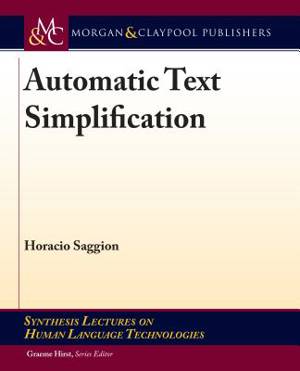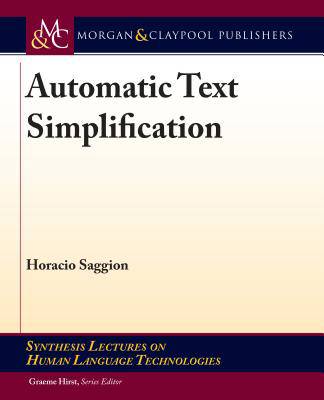
- Afhalen na 1 uur in een winkel met voorraad
- Gratis thuislevering in België vanaf € 30
- Ruim aanbod met 7 miljoen producten
- Afhalen na 1 uur in een winkel met voorraad
- Gratis thuislevering in België vanaf € 30
- Ruim aanbod met 7 miljoen producten
Zoeken
Omschrijving
Thanks to the availability of texts on the Web in recent years, increased knowledge and information have been made available to broader audiences. However, the way in which a text is written--its vocabulary, its syntax--can be difficult to read and understand for many people, especially those with poor literacy, cognitive or linguistic impairment, or those with limited knowledge of the language of the text. Texts containing uncommon words or longand complicated sentences can be difficult to read and understand by people as well as difficult to analyze by machines. Automatic text simplification is the process of transforming a text into another text which, ideally conveying the same message, will be easier to read and understand by a broader audience. The process usually involves the replacement of difficult or unknown phrases with simpler equivalents and the transformation of long and syntactically complex sentences into shorter and less complex ones. Automatic text simplification, a research topic which started 20 years ago, now has taken on a central role in natural language processing research not only because of the interesting challenges it posesses but also because of its social implications. This book presents past and current research in text simplification, exploring key issues including automatic readability assessment, lexical simplification, and syntactic simplification. It also provides a detailed account of machine learning techniques currently used in simplification, describes full systems designed for specific languages and target audiences, and offers available resources for research and development together with text simplification evaluation techniques.
Specificaties
Betrokkenen
- Auteur(s):
- Uitgeverij:
Inhoud
- Aantal bladzijden:
- 137
- Taal:
- Engels
- Reeks:
Eigenschappen
- Productcode (EAN):
- 9781681732145
- Verschijningsdatum:
- 25/04/2017
- Uitvoering:
- Hardcover
- Formaat:
- Genaaid
- Afmetingen:
- 190 mm x 235 mm
- Gewicht:
- 458 g

Alleen bij Standaard Boekhandel
+ 178 punten op je klantenkaart van Standaard Boekhandel
Beoordelingen
We publiceren alleen reviews die voldoen aan de voorwaarden voor reviews. Bekijk onze voorwaarden voor reviews.











